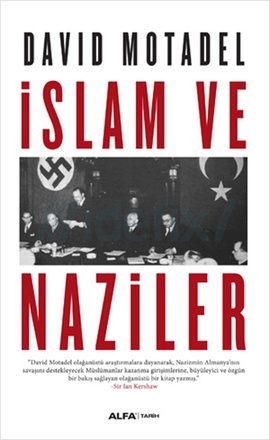‘Çarpıtılmış tarih anlatısını Netanyahu uydurmadı’


İsrail Başbakanı Binyamin Netanyahu’nun geçen hafta yaptığı ‘Hitler Yahudileri yok etmek istemedi, sürgün etmek istedi. Hitleri Yahudileri yok etmeye dönemin Filistinli müftüsü Emin el Hüseyin ikna etti’ açıklamalarının yankıları uluslararası platformlarda sürüyor. Netanyahu’nun, bu açıklamaları, İsrail politikası gereğince yaptığı söylense de, Nazilerle Müslümanların işbirliği tartışması da yeniden gündeme geldi. Netanyahu’nun bu açıklamalarını kısa süre önce Alfa Yayınları tarafından Türkçeye çevrilen ‘İslam ve Naziler’ kitabının yazarı Cammbridge Üniversitesi’nden tarihçi David Motadel ile konuştuk.
Netanyahu’nun açıklamasıyla tekrar gündeme geldiği gibi, Müslümanlar ve Naziler arasındaki ilişkili tartışmalı bir mesele. Siz bu ilişkiyi nasıl tanımlıyorsunuz?
Netanyahu’nun iddiası tarihin kötüye kullanılmasının tipik bir örneği. Kudüs müftüsünün İkinci Dünya Savaşı sırasındaki rolünü şişirmekle kalmıyor, ayrıca Almanya’nın Holokost’ta dair sorumluluğunu göreceli hale getiriyor. Netanyahu en büyük mücadelenin gerçekler için savaşmak olduğunu söylüyor ama bu gerçekleri çarpıtmamız gerektiği anlamına gelmiyor.
Müslümanların Nazilerle ilişkisi oldukça karmaşık. 1941-42’de, Hitler’in birliklerinin Müslüman nüfuslu Kuzey Afrika, Balkanlar, Kırım ve Kafkasya bölgelerine girdiği ve Ortadoğu ve Orta Asya’ya yaklaştığı sırada, Berlin’deki yetkililer İslam’ı politik olarak önemli görmeye başladılar. Fakat Nazilerin İslam’la ilişkisi sadece Müslüman bölgelerinin savaş bölgesi haline gelmesiyle alakalı değildi, daha da önemlisi aynı zamanda Almanya’nın askeri durumunun kötüye gitmesiyle alakalıydı. Hitler’in “yıldırım harekâtı” (Blitzkrieg) stratejisi Sovyetler Birliği’nde başarısız olmuştu. “Savunma Gücü” (Wehrmacht) baskı altında girmeye başlayınca, Berlin’deki stratejistler daha geniş savaş koalisyonları aramaya başladı ve böylece pragmatik davranışlar sergiledi. Müslümanların hamlesi işgal altında Müslüman bölgelerini pasifize edip, inançlı olanları Hitler’in ordularının yanında savaşmak için harekete geçirmekti. Nazi Almanya’sı, sözde ortak düşmanlarına karşı (Britanya İmparatorluğu, Sovyetler Birliği, ABD ve Yahudiler) “Müslüman dünyası” ile bir ittifak kurmak için önemli girişimlerde bulundu.

Kudüs müftüsünü Nazilerin Ortadoğu’daki azmettiricisi ve işbirlikçisi olarak mı tanımlıyorsunuz?
Emin el-Hüseyni’nin savaş sırasında Nazi Almanya’sına verdiği destek üzerine sayısız akademik çalışma yapıldı. Müftü 6 Kasım 1941’de Berlin’e gitti ve Almanya’nın Müslüman dünyasına yönelik propagandalarına büyük ölçüde dahil oldu. Emin el-Hüseyni Yahudilere karşı nefret doluydu. Yine onun Nazi Almanya’sındaki etkisini gereğinden fazla büyütmemeliyiz. Etkisi oldukça sınırlıydı. Berlin’deki yetkililer onu sadece bir propaganda aracı olarak görüyordu. En büyük kaygısı Arap ve Filistin bağımsızlığı için Almanya’da garanti almaktı ki bunu başaramadı. Hitler onunla sadece bir kere, 28 Kasım 1941’de, görüştü. Sohbetleri de manasız bir nezaket gösterisinden başka bir şey değildi. Müftü Arap ve özellikle de Filistin bağımsızlığı için yazılı bir garanti talep edince Hitler konuyu geçiştirdi. 1943’te Emin el-Hüseyni bir kere daha Hitler’le görüşmek istedi ama reddedildi.
Netanyahu Hitler’in o dönemde Yahudileri yok etmeyi değil, sürgüne göndermeyi istediğini iddia etti. Emin el-Hüseyni Hitler’e gitmiş ve onları sürgüne gönderirse geri döneceklerini söylemiş. Hitler onları ne yapması gerektiğini sorunca da Emin el-Hüseyni onları yakmasını söylemiş. Böyle bir konuşma asla olmadı. Bunu uydurdular. Müftü Holokost’un planlamasında yer almadı. SS Hareket Birlikleri (Einsatzgruppen) müftü Almanya’ya gelmeden çok önce, 1941’in yazında Polonya ve Ukrayna’daki Yahudileri sistematik olarak öldürmeye başlamıştı. Emin el-Hüseyni’nin Holokost’a doğrudan dahil olduğu “tek” zaman, savaş sırasında Yahudilerin Nazi Almanya’sının güneydoğu Avrupa’daki uydu devletlerinden Filistin’e göçünü durdurmak için araya girmesiydi.
Ayrıca, Netanyahu’nun el-Hüseyni’nin son çözümün uygulanmasında önemli bir rolü olduğu için Nürnberg mahkemelerinde savaş suçundan dolayı yargılanmak istendiği iddiası da doğru değil. Müftü hiçbir zaman “son çözüm”deki rolü nedeniyle Nürnberg mahkemeleri tarafında aranmadı. Savaştan sonra Yugoslavya, Bosna’da, 1944’de savaş suçları da işlemiş olan, (ağırlıklı olarak Müslüman) bir SS bölgesi kurulmasındaki rolünden dolayı mahkemeye çıkması için bir talepte bulundu. Bu da gerçekleşmedi. Londra’daki yetkililer, el-Hüseyni’yi Nürnberg mahkemelerinde yargılanacak kadar önemli bulmadıkları için bu talebi desteklemediler, ayrıca manda altındaki Filistin’deki yaygın huzursuzluktan endişelilerdi.
Avrupa’daki Müslümanları Nazileri nasıl görüyordu?
Nazilerin Avrupa’da karşılaştığı ilk büyük Müslüman azınlık topluluğu Fransa’daki Müslümanlardı. Savaş sırasında Fransa’da yaklaşık 100 bin Müslüman yaşıyordu. Fransa ve Nazi işgalindeki Avrupa’daki en önemli İslam merkezi Paris Büyük Cami’ydi. Bu cami Birinci Dünya Savaşı’ndan sonra, Müslümanların savaştaki çabalarına minnettarlıklarını göstermek için Fransız hükümeti tarafından yaptırılmıştı ve Cezayirli din âlimi Si Kaddour Benghabrit tarafından yönetiliyordu. Paris’teki Alman yetkililer Si Kaddour Benghabrit’i destekledi ve camiyi propagandaları için kullanma girişimlerinde bulundu. Benghabrit, yetkililerle yakın ilişkiler kurarak cemaatinin koşullarını iyileştirmeye çalıştı. Özellikle de savaş esiri kamplarındaki Müslümanların durumu için endişeleniyordu. 1941’in başlarında Paris’teki Alman büyükelçiliği yetkilileriyle görüştü. Esirlere ayrıcalık tanınmasını, hatta sadakatlerine talip olduğu birkaç Kuzey Afrikalı imamı kamplara göndermeyi talep etti. Ayrıca kendisinin de hizmet verebileceğini söyledi; esirlerin dini işlerini yürütmeyi ve Almanya’nın Arapça propaganda yayınlarına çıkmayı teklif etti.
Nazilerin karşılaştığı bir diğer Avrupalı Müslüman azınlık ise Polonya ve Baltık Devletleri’ndeki Tatarlardı; onları da kendi yanlarına çekmek istediler.
Almanların Avrupa’da karşılaştığı en önemli Müslüman nüfusu Balkanlar’daydı: Almanlar 1941’de Yugoslavya’yı işgal edip dağıttığında, ilk başta Müslüman nüfuslu bölgelere girmediler –en önemlisi, yeni kurulmuş Hırvatistan Ustaşa devletinin kontrolüne giren Bosna-Hersek’e. Ustaşa rejim, Yahudileri öldürüp Ortodoks Sırpları cezalandırırken Müslümanlara dokunmadılar. 1942’nin başlarından itibaren, bölge Hırvatistan rejimi, Tito’nun komünist partizanları ve Ortodoks Sırp Çetnikler arasındaki şiddetli çatışmalara sahne olmaya başladı. Çetnikler, Ustaşa birliklerine ve Tito partizanlarına karşı savaşıyordu. Müslüman nüfussa üç tarafından saldırısı altındaydı. Ustaşa yetkililer Müslüman ordu birliklerini Tito partizanlarına ve Çetnik milislerine karşı savaşmak ve Ortodoks Sırp bölgelerini kontrol etmek için kullandı. Kısa sürede Müslüman köyleri mislimle saldırılarının hedefi haline geldi. Müslüman kurbanların sayısının on binleri bulduğu tahmin ediliyor. Nihayetinde Müslüman temsilciler yardım için Almanlara başvurarak Hitler’in korumasında Müslüman özerkliği talep ettiler. Almanlar buna olumlu yaklaştı. Balkanlar’daki iç savaş kontrolden çıkınca, Almanlar Müslüman nüfuslu bölgelerle daha çok ilgilenmeye başladı. Bölgeyi yatıştırma girişimlerinde, Wehrmacht ve daha da önemlisi SS, Müslümanları müttefik olarak gördüler ve Nazi Almanya’sını güneydoğu Avrupa’daki Müslümanların koruyucusu olarak tanıttılar. Bu kampanya 1943’ün baharında, Bağdat müftüsünü dini liderler buluşup Mihver Devletleri lehine konuşmalar yapmak üzere Zagreb, Banja Luka ve Saraybosna’ya göndermesiyle başladı. Saraybosna’daki Gazi Hüsrev Bey Camii’nde Müslümanların çektiği acılar üzerine o kadar duygusal bir konuşma yaptı ki dinleyenlerin çoğu gözyaşlarına boğuldu. Sonraki aylarda, SS (ağırlıklı olarak Müslüman olan) bir SS bölgesine Bosna-Hersek’ten yaklaşık 20 bin asker topladı; bu bölgeye daha sonra SS-Handzar denmeye başlandı. Dahası, dini içerikli bir propaganda yapmaya ve Müslüman ruhani liderlerle daha yakın ilişki kurmaya başladılar, çünkü dini liderlerin insanlar üzerinde güçlü bir otoritesi olduğuna inanıyorlardı. Kafkasya ve Kırım’ın aksine, Almanlar İslam kurumlarının sağlam olduğunu gördüler: Müslümanlar, en büyük dini komite olan Ulema Meclisi’nin otoritesi altındaydı. Ordu yetkilileri bu meclisin üyelerine düzenli olarak danıştı ve onları yanlarına çekmeye çalıştı. Ulemanın çoğu üyesi, Almanların bir Müslüman devleti kurulması için onlara yardım edeceğini umuyordu. Ne var ki kısa süre için Wehrmacht ve SS’in bölgeyi yatıştıramayacağı ortaya çıktı. Aynı zamanda, Almanların Müslümanları desteklemesi, partizanların ve Çetniklerin onlara karşı düşmanlığını kızıştırdı. Şiddet tırmandı. Sonunda 250 bin Müslüman çatışmalarda öldü.

Alija Izetbegović’in Nazi geçmişine dair büyük dedikodular var. Bu meseleyle ilgili bir kanıt var mı?
Benim bildiğim kadarıyla buna dair bir kanıt yok. Alija Izetbegović, El-Hidaje Cemiyeti’nin gençlik yapılanması olan Müslüman Gençler Kulübü’ne üyeydi. Bu cemiyetin bazı üyeleri Almanya’yı destekliyordu. El-Hidaje’in lideri, El-Ezher Üniversitesi’nde eğitim almış bir âlim olan Mehmed Handžić. Aynı zamanda Ulema Meclisi’nin de üyesi olan Handžić, Almanlara işbirliği yapmaya çalıştı. El-Hüseyni’nin Balkan turu sırasında, Saraybosna’da onunla görüştü.
Nazilerle birlikte insanlığı karşı suç işlediği gerekçesiyle mahkemeye çıkan bir Müslüman işbirlikçi var mı?
1941’den itibaren, savaşın ibresi Mihver Devletleri’nin aleyhine dönmeye başladığında, Wehrmacht ve SS, aralarında Bosnalıların, Kırım Tatarlarının ve Kafkasya ve Orta Asya’dan Müslümanların olduğu on binlerce Müslüman’ı askere aldı. Müslüman askerler tüm cephelerde savaştı; Stalingrad ve cephelerinde Varşova ve Berlin’in savunmasında görev aldılar. Bu askerlerden bazıları savaş suçu işledi. Kosova’daki Müslüman SS askerleri Yahudilerin tehcirinde bile görev aldı. Ama bildiğim kadarıyla bu istisnai bir durumdu. Doğrudan Holokost’a dahil olmuş başka bir Müslüman SS ya da Wehrmacht birliği bilmiyorum. Müslümanların Kuzey Afrika, Balkanlar, Kafkasya ve Kırım’daki Yahudilerin gördüğü zulme verdiği tepkiler çeşitliydi ve her yerde olduğu gibi, işbirliği ve vurgunculuktan, umursamazlık ve bazı durumlarda empatiye değişkenlik gösteriyordu. Müslümanların Yahudi komşularına yardım ettiği de olmuştu. Savaş bölgesinde bazı Müslümanlar da soykırımdan bizzat etkilenmişti. Sovyetlerin işgalinden sonraki ilk birkaç ayda, SS birçok Müslüman’ı, özellikle de savaş esirini, sünnetli olmalarını Yahudiliklerinin bir göstergesi sayarak infaz etti. Nihayetinde, SS Güvenlik Başdairesi’nin başkanı olan Reinhard Heydrich, SS güçlerinin daha dikkatli olmasını ve Müslümanlarla Yahudileri karıştırmamasını söyleyen bir talimat yolladı. Fakat Sovyetlerin güneydeki sınır bölgelerinde Nazi infaz timleri Müslümanlarda Yahudileri birbirinden ayırmakta zorlanıyordu. Müslümanların Bosna-Hersek’teki ayrıcalıklı konumu çoğu Yahudi’ye zulümden kaçmak için bir çözüm olarak göründü. Çoğu baskı ve tehcirden kurtulmak için resmi olarak Müslüman olmaya çalıştı. 1941 yılının Nisan ve Ekim ayları arasında sadece Saraybosna’da, Yahudilerin yüzde 20’sinin Müslüman ya da Katolik olduğu tahmin ediliyor; çoğu sünnetli olduğu için Müslüman olmak daha kolay bir seçenekti. Bazı Yahudiler Müslüman olarak gizlenerek kaçmayı başardı, kimileri gerçekten İslam’ın arkasına sığındılar. Ayrıca Avrupa’daki Romanların öldürülmesi de doğrudan Müslümanlara alakalıydı. Almanlar Roman nüfusu için Sovyetlerin işgal altındaki bölgelerini denetlemeye başlayınca, birçok Müslüman Romanla karşılaştılar. Aslında Kırım’daki Romanların çoğunluğu Müslüman’dı. Yüzyıllar boyunca, onlarla ciddi anlamda dayanışma gösteren Tatarlara karışmışlardı. Birçok Müslüman Roman, Tatarların desteğiyle, Müslüman Tatarlarmış gibi davranarak tehcir ve ölümden kurtulmaya çalıştı –bazıları bunu başardı. Balkanlarda da çok sayıda Müslüman Roman vardı ve Almanlarla Ustaşa müttefikleri Roman nüfusunu öldürmeye başladığında, en azından resmi olarak Müslüman Romanları infaz ve tehcire maruz bırakmadılar.
Sizce Netanyahu’nun açıklamalarının sebebi nedir? Politik amaçları için Holokost’u bile araçsallaştırıyor mu yoksa bunlara gerçekten inanıyor mu?
Bunu kesinlikle politik amaçları için yaptı. İsrail’deki bazı radikal politikacılar, Filistinli muhalifleri –bazen de genel olarak Müslümanları– en büyük kötülüğü temsil eden Nazilerle ilişki içinde göstermek için müftünün işbirliğini kullanmaya çalışıyor. İsrail’in Dışişleri Bakanı Avigdor Lieberman 2009’da, 1941’deki El-Hüseyni Hitler görüşmesinin fotoğraflarına diplomatlarına göndererek, bunları İsrail’in çıkarlarına hizmet edecek şekilde kullanmaları talimatını verdi. 2014’te Pamela Geller’in kötü şöhretli Amerikan Özgürlük Savunma Girişimi, Washington DC’deki otobüslere aynı fotoğrafların yer aldığı reklamlar koydu. Bu girişimleri tek amacı, Filistinlileri ya da daha genel olarak Müslümanları Nazilerle ilişkilendirerek onları karalamaktı. Son yıllarda bazı politika yorumcuları daha da ileri giderek müftünün doğrudan Holokost’tan sorumlu olduğunu iddia etti. Aslında bu çarpıtılmış tarih anlatısını Netanyahu uydurmadı. Bir süredir birkaç politika yazarı tarafından yayılıyordu.
“Kavgam”da Hitler Arapların daha aşağı nitelikle olduğunu yazmıştı. Nazi Almanya’sı Araplarla işbirliği yapabilmek için iddialarını manipüle mi etti?
Evet. Almanya’nın İslam dünyasıyla ittifak kurma çabalarının amacı, her şeyden önce pragmatik değerlendirmelerin sonucuydu. İdeoloji bazı sorunlara yol açtı. Rejimin Müslüman dünyasına yönelik politikasının önündeki en önemli engel ırkçı olmalarıydı. Hitler “Kavgam”da zaten Avrupalı olmayan insanların, özellikle de Arapların ve Hintlilerin, ırk olarak daha aşağı olduklarını öne sürmüştü. Fakat Alam yetkililer iktidara gelince daha pragmatik davranmaya başladılar. Yahudi olmayan Türkler, İranlılar ve Araplar, Tahran, Kahire ve Ankara’daki hükümetlerin diplomatik müdahalelerin ardından, 1930’lardaki resmi ırkçı ayrımcılıktan açıkça muaf tutuldular. Ve savaş sırasında Almanlar da Balkanlardaki Müslümanlar ve Sovyetlerdeki Türki azınlıklarla karşılaşınca pragmatik davrandılar. Din meselesinde durum daha kolaydı. İleri gelen Naziler, özellikle Hitler ve Himmler, sürekli İslam’a duydukları saygıyı ifade ediyorlardı. Hitler Katolik Kilisesi’ni reddederken İslam’ı onun karşısına koyuyordu; Katolikliği zayıf ve yumuşak bir din olarak görürken, İslam’ın güçlü, saldıran ve savaşı bir din oluşunu övüyordu. Ama sonuçta bunlar ideolojik değil stratejik hamlelerdi ve Nazi Almanya’sını İslam’ı harekete geçirme amacına hizmet ediyordu.
Ortadoğu’daki en büyük Müslüman Nazi destekçileri kimlerdi? Arapların Nazi sempatizanı olduğunu söyleyebilir miyiz, yoksa Nazilere karşı mücadele eden gruplar da var mıydı?
Naziler Arap dünyasında büyük bir Mihver taraftarı ayaklanma başlatmayı başaramadı. Hitler’in müttefiki Mussolini Kuzey Afrika’daki savaş bölgesinde, Libya’da, baskıcı bir sömürge rejimi uyguluyordu ve o bölgedeki Müslümanların, en hafif ifadesiyle, Mihver Devletler’e yönelik çekinceleri vardı. Sirenayka’daki en güçlü dini güç olan İslami Senusiye tarikatı, İtalyan yönetimine karşı sömürgecilik karşıtı direnişin lideriydi ve Mihver Devletler’e karşı Montgomery’nin ordusunun yanında savaştı. Ne olursa olsun, Berlin’in Müslümanları özgürleştirme İslam’ı koruma vaadi, savaşın Kuzey Afrika’ya getirdiği şiddet ve yıkımla keskin bir tezat oluşturuyordu. Doğu cephesinde ise durum çok farklıydı. Kırım ve Kuzey Kafkasya’daki Müslümanlar, 18. ve 19. yüzyıldaki çar ilhaklarından beri merkezi devletin karşısındaydı ve Bolşevik egemenliği durumu daha da kötüleştirdi. Müslüman bölgeleri, Stalin’in yönetiminde eşi benzeri görülmemiş politik ve dini zulme maruz kaldılar. Kafkasya ve Kırım’ın işgalinden sonra, çoğu Almanları iyi niyet ve umutla karşıladı. Ama burada da Alman yetkililer ve yerli halk arasındaki ilişki kısa sürede tavsadı. Balkanlardaki durumda buna benzerdi. Sonuç olarak Almanların Müslümanlarla ittifak kurma girişimleri Berlin’deki stratejistlerin umduğu kadar iyi gitmedi. Çok geçe harekete geçmiş ve savaşın şiddetli gerçekleriyle çok fazla yüz yüze gelmişlerdi. Ayrıca Almanlar, Müttefik Devletler’e karşı etkili bir Müslüman ayaklanmasını teşvik etmeyi de başaramadılar. On binlerce Müslüman Alman ordusunda görev almış olsa da, neticede İngilizler, Fransızlar ve Sovyetler Müslüman komşularından yararlanmada daha başarılı oldular: yüz binlercesi Hitler’in Almanya’sına karşı onların ordularında savaştı. Sadece Fransız Kuzey Afrika’dan, neredeyse 250 bin Müslüman Gaulle’ün birliklerine katılıp Avrupa’yı özgürleştirdiler.



